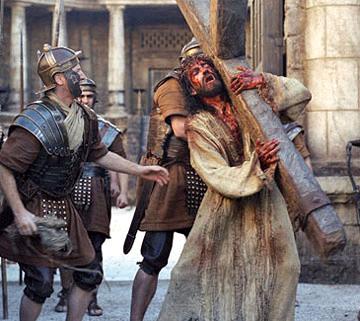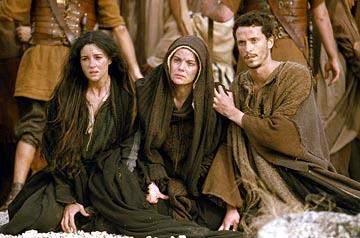

The death and resurrection of Jesus Christ forms the lynchpin of Christianity, and has been portrayed in film over the years in varying degrees of success. Mel Gibson's The Passion of the Christ is certainly the bloodiest and most brutal portrayal. The film chronicles the last twelve hours in the life of Jesus, one filled with constant beatings and humiliation. One of the archaic definitions for the word "passion" is suffering, and that is an apt description of what Jesus (Jim Caviezel, High Crimes, The Count of Monte Cristo) goes through. The Passion also arrives with allegations of anti-Semitism in one camp and opportunities for evangelism in another. In the end, it is all a bunch of free publicity for the film, and supporters and detractors of both sides can and probably will see what they want to see. If all the hoopla were not there, The Passion of the Christ would probably be another art house film ignored by most of the movie going public. The fact that it is subtitled is usually a turn-off for most people.
The film begins late at night in the Garden of Gethsemane, where Judas (Luca Lionello, L'Italiano, The Squad) betrays Jesus to the authorities. The Jewish leaders, led by Caiphas (Mattia Sbragia, The Order, Heaven) feel threatened by Jesus' presence, and will stop at nothing to ensure he threatens them no more. The next day they present him to Pontius Pilate (Hristo Shopov, Dark Descent, The Grey Zone), who is extremely reluctant to do anything. He wants to free Jesus, but Caiphas presses him for crucifixion. Pilate reluctantly agrees, thus sealing the fate of Jesus. This is essentially all of the plot in the film. Gibson (Braveheart, The Man Without a Face) and co-writer Benedict Fitzgerald (Wise Blood) is light on story but heavy on violence.
The level of the brutality directed at Jesus is astounding. The onscreen violence is so disturbing that it certainly merits an NC-17 rating, but the Pharisees at the MPAA will never give this rating for violence. Gibson put this violence in intentionally. He wants to show how much Jesus suffered. Jesus suffered so that everybody will be saved. The problem is that there is no context. Gibson does flash back to better times, and there are snippets of his teachings, but the overwhelming amount of screen time is devoted to sadistic beatings by the Romans and an excruciatingly painful crucifixion. The scenes are shocking and visceral, and affect a response in the viewer that is exactly what Gibson wants. He is no stranger to violence, both as an actor and director. He is using the violence here send a message to the audience, and that message comes across loud and clear. In this sense, The Passion of the Christ is a powerful movie. Even the most jaded moviegoer will leave the theater subdued after witnessing what Jesus experienced.
However, because of the lack of balance, The Passion is not able to achieve much more. The film begins rather slowly, then turns into an extended, vicious beating. When looking at purely what was shown on screen, a number of questions emerge. Why did the Jews want him dead so badly? What's the big deal about him dying? This is where Gibson's choice to focus on the last twelve hours limits him. He cannot adequately provide reasons for why the characters are acting the way they are. Sure, most people know these answers, but it leaves gaps in the film, bringing it down. Still, Gibson is a seasoned and skilled filmmaker, and The Passion of the Christ is a well-made film, and Caviezel was a good choice. As an actor, Caviezel usually seems distant and unemotional, almost otherworldly. In most other roles this is not a good thing, but as Jesus, it works. It should be noted that for most of the film he is being whipped, beaten, or crucified, so this aspect of his performance isn't that necessary. The only other actors to make any sort of impression are Monica Bellucci (The Matrix Revolutions, Tears of the Sun) as Magdalen and Maia Morgenstern (Fool's Song, Bed of Procust) as Mary. And most of what they do is cry.
Now, is this film anti-Semitic? There is no reason to believe that Gibson (even with his father's non-belief about the Holocaust) intentionally put anything anti-Semitic in the film. He does portray some Jews as sympathetic, and even has some Jewish leaders calling the witch-hunt against Jesus a travesty. Yet, if somebody wants to interpret the film as such, they probably could. Pilate is portrayed as a patsy, almost an unwilling pawn in the schemes of Caiphas. His participation was necessary, since Jewish law did not allow him to kill Jesus. Caiphas is absolutely portrayed as an aggressor. He will stop at nothing until Jesus is dead. But his character serves as more of an antagonist than anything else. Far from creating an object of hatred for simple-minded bigots, Gibson uses the Caiphas character to show the hatred directed at Jesus and to move the story forward. Gibson also wants to show that it wasn't just the Jews that killed Jesus. Everybody killed him. And this is what has a harder time coming out in the film.
Which is there the churches come in. There is an unprecedented amount of evangelical interest in this film. Gibson is encouraging churches to use The Passion as a tool for evangelism. They can invite non-believers to watch the film and then be available to answer any questions. Churches around the country are buying out screenings. As it is, this is not the greatest tool for outreach, since its focus seems to be in the wrong place. The whole thing sounds like a nice idea, but also smacks of commercialism. The number of screens this film is being released on is phenomenal, usually reserved for large blockbusters. It feels a lot like Gibson is tapping into a demographic not known for going to movies, a trend that started with The Omega Code. These people will see the movie because they feel it is their duty to do so. Other religious films like Joshua and The Gospel of John have come and gone with a minimum amount of fanfare, but then again none have the name MEL GIBSON attached. In the end, it is important to remember that regardless of what Gibson says, this is his version of the Gospels, and not the divine truth. Unfortunately, many Christians will love the film because they are conditioned to do so, not because it is a great film. They will judge it based on the fact that they agree with all the aspects of the film, not because of how well it was made or how successfully it conveys its message.